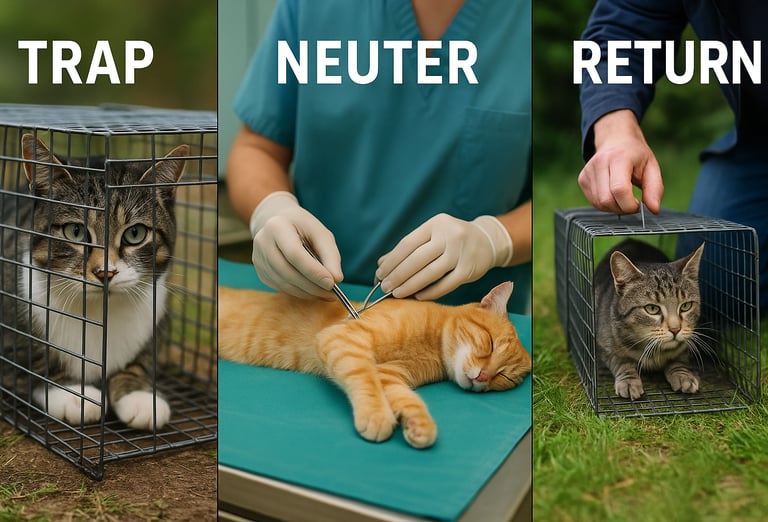What is TNR?
TNR stands for Trap-Neuter-Return. It’s a process where feral or stray cats are humanely trapped, taken to a veterinary clinic where they are spayed or neutered, vaccinated, and sometimes treated for minor injuries or illnesses. After recovery, they are returned to the same location where they were found. This is their home, and they are usually familiar with their territory.
The cats are often “ear-tipped” — a small portion of one ear is surgically removed under anesthesia — which is a universal sign that the cat has been altered and vaccinated. This prevents future trapping and unnecessary stress on the animal.
Why TNR Works
Unlike catch-and-kill or relocation methods, which are both expensive and ineffective in the long run, TNR stabilizes cat colonies and gradually reduces their population through natural attrition. When cats are removed, new unaltered cats often move into the area, known as the “vacuum effect.” This resets the population problem. But when cats are sterilized and returned, they defend their territory from newcomers without producing more kittens.
In areas with active TNR programs, studies have shown a population decline of up to 66% within just a few years. Additionally, because the cats are no longer mating or fighting, noise complaints and aggressive behaviors also decrease.
Health Benefits for Cats
TNR significantly improves the lives of stray and feral cats. Spaying and neutering eliminates the risks of reproductive cancers and infections. Vaccinations protect against deadly diseases like rabies and feline distemper. By reducing mating behaviors, cats are less likely to engage in fights, roam over large distances, or suffer injuries.
In some programs, cats with minor medical issues also receive treatment before being returned. This reduces suffering and helps maintain a healthier colony overall.
Community Benefits
TNR doesn’t just help cats—it benefits communities as a whole. Residents report fewer nuisance behaviors such as spraying, yowling, and fighting. Public health risks from unvaccinated animals are reduced. Fewer kittens mean fewer cats entering overcrowded shelters, where many may be euthanized if homes can’t be found.
Moreover, TNR encourages community involvement. Volunteers and local organizations like Catt County Cat Nippers take ownership of monitoring colonies, ensuring feeding stations are clean and safe, and reporting any new arrivals. This creates a stronger, more compassionate community dynamic.
Cost-Effectiveness
TNR is cost-effective. Traditional animal control methods that rely on trapping and euthanizing animals are expensive and often repeat the same cycle without lasting results. TNR, especially when supported by donations and volunteers, can achieve better outcomes for far less money.
By reducing the number of cats entering shelters, municipalities save on housing, food, and medical care. Fewer cats also mean less strain on animal control services, allowing them to focus on emergencies and other pressing issues.
Getting Involved
Residents of Cattaraugus County can help support TNR efforts in several ways:
- Report feral cat colonies to Catt County Cat Nippers
- Volunteer for trapping, transport, or colony care
- Donate supplies or funds to support low-cost spay/neuter clinics
- Educate neighbors about the benefits of TNR
- Advocate for TNR-friendly policies in local government
Even small actions—like helping trap one cat or distributing flyers—can make a meaningful impact.
TNR and Shelter Integration
Some shelters in progressive communities are now partnering with TNR programs instead of automatically admitting feral cats. This integration helps identify which cats are truly adoptable and which are better suited to return to their colonies. It also helps reduce euthanasia rates and improves the overall image of animal control agencies.
Conclusion
The TNR program is a compassionate and scientifically proven solution to the problem of stray cats. It not only reduces the number of unwanted kittens born each year but also improves the health and safety of existing cats. Programs like the one run by Catt County Cat Nippers in Cattaraugus County are making a real difference by combining practical strategy with community compassion.
Through TNR, we can give stray cats a better life—and build a better, more humane community for everyone.


How the TNR (Trap-Neuter-Return) Program Helps Stray Cats
The Trap-Neuter-Return (TNR) program is one of the most humane and effective strategies for managing stray and feral cat populations. In communities like Cattaraugus County, where the number of unowned outdoor cats continues to grow, implementing TNR programs not only helps reduce the number of cats living on the streets but also improves their health, safety, and well-being. It’s a community-wide solution that benefits animals, people, and the local environment.
CATT COUNTY CAT NIPPERS
Subscribe to our website
Contact us :
Quick links :
Contact Us
© 2025 CATT COUNTY CAT NIPPERS All rights reserved.
